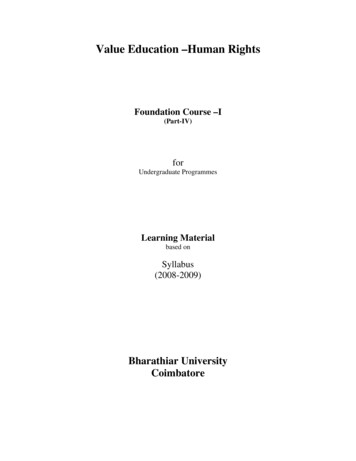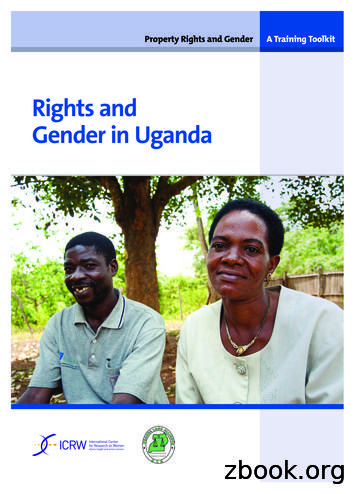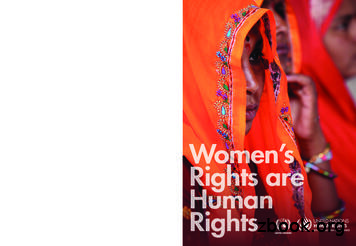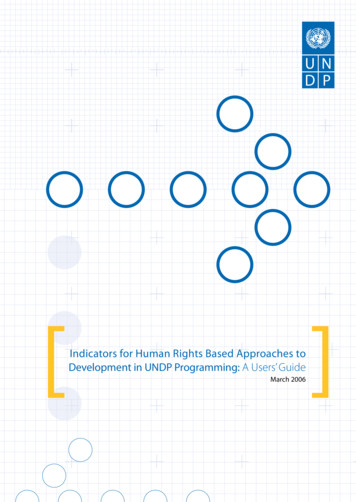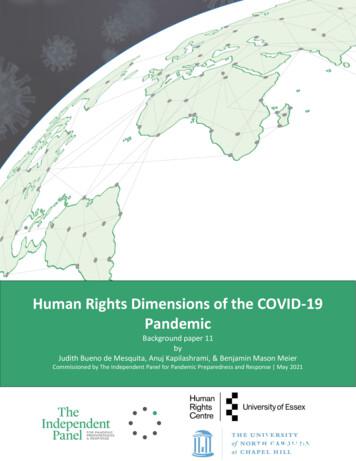Value Education –Human Rights - Bharathiar University
Value Education –Human RightsFoundation Course –I(Part-IV)forUndergraduate ProgrammesLearning Materialbased onSyllabus(2008-2009)Bharathiar UniversityCoimbatore
Compiled by1. Dr. Sheela Ramachandran (Convenor)PrincipalPSG College of Arts & ScienceCoimbatore2. Dr. R.P. Thangaraj (Member)PrincipalShri Kumaran College of Arts and ScienceCoimbatore4. Miss.P.G. Thamaraiselvi (Member)SG LecturerGovernment Law CollegeCoimbatore5. Dr. K. Perumal (Member)Reader in PhysicsSRMV College of Arts & ScienceCoimbatore3. Dr. G. Sudhakar (Member)Former DirectorAcademic Staff CollegeBharathiar UniversityUnder the guidance of1. Col.Prof. Dr.G.ThiruvasagamVice ChancellorBharathiar University2. Dr.P.ThirumalvalavanRegistrarBharathiar University3. Dr. M.A. KandaswamyDean, College Development CouncilBharathiar University
BHARATHIAR UNIVERSITY : COIMBATORE 641 046.Value Education – Human Rights(2 hours per week)(FOR THE UNDER GRADUATE STUDENTS OF AFFILIATED COLLEGESWITH EFFECT FROM 2008-2009)UNIT – I :Concept of Human Values,DevelopmentValue Education Towards PersonalAim of education and value education; Evolution of value oriented education; Concept ofHuman values; types of values; Components of value education.Personal Development :Self analysis and introspection; sensitization towards gender equality, physically challenged,intellectually challenged. Respect to - age, experience, maturity, family members, neighbours,co-workers.Character Formation Towards Positive Personality:Truthfulness, Constructivity, Sacrifice, Sincerity, Self Control, Altruism, Tolerance, ScientificVision.UNIT – II : Value Education Towards National and Global DevelopmentNational and International Values:Constitutional or national values - Democracy, socialism, secularism, equality, justice, liberty,freedom and fraternity.Social Values - Pity and probity, self control, universal brotherhood.Professional Values - Knowledge thirst, sincerity in profession, regularity, punctuality and faith.Religious Values - Tolerance, wisdom, character.Aesthetic values - Love and appreciation of literature and fine arts and respect for the same.National Integration and international understanding.UNIT – III : Impact of Global Development on Ethics and ValuesConflict of cross-cultural influences, mass media, cross-border education, materialistic values,professional challenges and compromise.Modern Challenges of Adolescent Emotions and behavior; Sex and spirituality: Comparision andcompetition; positive and negative thoughts.
Adolescent Emotions, arrogance, anger, sexual instability, selfishness, defiance.UNIT - IV : Theraupatic MeasuresControl of the mind througha. Simplified physical exerciseb. Meditation – Objectives, types, effect on body, mind and soulc. Yoga – Objectives, Types, Asanasd. Activities:(i) Moralisation of Desires(ii) Neutralisation of Anger(iii)Eradication of Worries(iv) Benefits of BlessingsUNIT; V : Human Rights1.Concept of Human Rights – Indian and International Perspectivesa. Evolution of Human Rightsb. Definitions under Indian and International documents2.Broad classification of Human Rights and Relevant Constitutional Provisions.a. Right to Life, Liberty and Dignityb. Right to Equalityc. Right against Exploitationd. Cultural and Educational Rightse. Economic Rightsf. Political Rightsg. Social Rights3.Human Rights of Women and Childrena. Social Practice and Constitutional Safeguards(i)Female Foeticide and Infanticide(ii)Physical assault and harassment(iii) Domestic violence(iv)Conditions of Working Women4.Institutions for Implementationa. Human Rights Commissionb. Judiciary5.Violations and Redressela. Violation by Stateb. Violation by Individualsc. Nuclear Weapons and terrorismd. Safeguards.
MODEL QUESTION PAPERAnswer any 5 questions from the followingEach questions carries 10 ch of above questions will be drawn from each UnitQuestions will be drawn from the 50 questions (10 X 5 Units) given at the end of eachunits learning material.
Unit-IConcept of Human Values, Value Education Towards Personal DevelopmentMan is a social animal in that whatever he needs and wants he gets from the labour andcooperation of the society. Similarly, whatever he produces materially and whatever theknowledge he acquires are spreading to all people of the world. To cope with the diverse modernenvironments everyone should have holistic education to sympathize and live in tolerance withthe standards of his fellow beings. By the phrase “holistic education” I am not including thespecific sciences, which can be learned according to the wish of the individual; what I mean isthe overall education of the facts of human life, including human values, which are theculmination of the evolutionary process of mankind.In primordial times man lived on the earth in small groups. Each group developed its ownway of life according to the climate, available natural resources and the developed productionskills. There was little opportunity to spread over a wider area and encounter or adopt thecultural values of others. Such restrictions have been removed these days by rapid transportation,communication and international educational facilities. Social environments have entirelychanged. To fully avail of the present opportunities for a better life the modern educationalsystem should be reformed and reoriented. This is what I stress as the need for holistic education.Due to the lack of such education the majority of people in human society are leading a life ofignorance and following obsolete, useless principles and beliefs.In reality, the world is one; the sea is one to supply water for all by way of vapour-cloudrain; the air we breathe is only one. Man has not created any one of these four essentialresources. Everybody is born, grows, lives and dies. During the lifetime everyone enjoys thebenefits of labour and technical knowledge of all the people. In turn, everyone’s production andservices go to all people of the society.Then why are enmity, hatred, exploitation and wars extant in human society? In everywar one group of people kills the other group. What can be the net result? Only murderers willsurvive in the world. Any person of ordinary intelligence can realize the fact that war is not
beneficial in any way for human society. It continues only die to conditioned thinking andspurred by those who prosper by selling war materials. Although the human race has existed overthousands of years, the individual life is experienced only once. Why should its enjoyment besacrificed due to ignorance?Individuals who are living engrossed in sensory engagement cannot understand thedetrimental results of their own actions. It is the responsibility of elders and enlightened peoplethe best way of life, and then disseminate the knowledge through all available media. Such aplanned method of living should be inculcated as a holistic education in all institutions to trulycivilize all people, whatever may be their other fields of study.As a result of holistic education one would know the values of human life, how to respectothers, how to be aware and avoid doing harm and at the same time, being ready to help others inall possible ways. These values are the culmination of our inborn sixth sense and theirimplementation is the very purpose of human birth.Through holistic education, each person should know himself as completely as possible,i.e., his body mind, knowledge, consciousness, genetic center, and brain function, including theprocess of storing and releasing all the experiences of life. Education in the science of livingshould begin with the basics of understanding the human physiology, growth and development:the importance of personal hygiene; reproductive health; physical and mental energy use,conservation and potential; prevention of disease; healthy eating habits; and simple first-aid andself-medication with home remedies. The next level would be learning about the importance andvalue of one’s relationships –with parents, teachers, friends colleagues, the future life partner andchildren. The concepts of morality, ethics, duty, honesty, sincerity, kindness and compassionshould be imparted. Each person should know how to adjust with others and be prepared tosacrifice his whims and pleasures for the benefit of the group or family so as to avoid conflictand live in harmony.
Education can be categorized into five divisions. They are:1) Cultural2) Social3) Productive4) Science and technology5) SpiritualTo cope with the modern age, all these five kinds of education are needed for all people inthe society.1) Learning life-education from parents without going to school is cultural education.This education naturally evolved according to the time, place and environment inwhich the people lived.2) Learning a virtuous way of life following morality, duty and charity is socialeducation. This kind of education is a must for protection, help, distribution ofcommodities and facilities and for peaceful living with one’s fellow beings.3) The basic needs of mankind are food, shelter and clothing. Learning the process ofproducing the above, as well as other skills related to these industries are productiveeducation.4) Age after age, year after year, new and easy methods for living are discovered by thescientists and technicians. Learning these new technologies and enhancing thestandard of living is the education of science and technology.5) Knowing the three invisible truths of the Unified Force, life force and universal andbio-magnetic forces and maintaining physical health and mental health of self andsociety is spiritual education.In the earlier age of life it is necessary for everyone to be given these education forprosperity, happiness and peace of the society. Because of a lack of these imperative systems ofeducation poverty, crime, conflicts, problems in life and wars emerge. Absence of such propereducation results in the torturing of mankind and suppressing the development of consciousness.The purpose of life is being lost.
The Heart of EducationIntroductionOver the past decades since the inception of our modern school and collegiate system,educators, parents and students have realized there is an area of insufficiency in the system wehave instituted. Although academic subjects may be thoughtfully planned and courses have beenstructured for the maximal suitability and benefit of our youth for career purposes, the topic ofpersonal behavior and attitudes has not been given due importance or emphasis in theeducational curriculum. The assumption has been that children imbibe all the values and ethicsthey need from their home lives, and that it is not the purview of the educational system todiscuss these at all, especially since it was felt that such discussion may lead us intocontroversies among various communities. However, as a nation we now realize the error in thisassumption and there is widespread recognition of the need to talk about values in oureducational system as they pertain to every sphere of life. We can all acknowledge that there isno need to worry about cultural sensitivities or controversy if the most basic values are taught toour youth, as there are many values, which are admitted to be universal. Certain community orculturally based values may be relative, but there are attitudes and behaviors based in universalvalues that unquestionably contribute to the health, happiness and wealth of each person and thesociety as a whole.The evidence is all round us that the lack of such education results in selfishness and anuncaring attitude toward one’s fellowmen; at worst it results in violence, exploitation and utterdisregard for life that no society can afford or it will forfeit its prosperity and peace, and be liableto descend into anarchy or fascism. Our wonderful country, simultaneously blessed and burdenedwith its extreme density of population and diversity of communal and religious sentiments, canonly survive with a majority that is mentally and physically healthy, tolerant and liberal inoutlook, as only such citizens will be able to care for and work for the prosperity of all.Aims of EducationAll round development of individuals is possible through education. Among itintellectual, mental and functional development is expected. Though cognitive and conative
domains are developed through today’s educational system, affective domain cannot receive itsproper place. That is the reason for paucity of national attitude, and social consciousness amongstudents. If moral, social and spiritual values are exchanged through the media of subjectcontent, emotional development will easily be possible.Following are the chief aims of education:1. Knowledge2. Understanding3. Application4. Skill5. Interest and aptitude6. Appreciation7. Inculcation of human valuesNEP 1986 prepared value based curriculum. It also made clear and fixed particular valuesalong with objectives while teaching particular units.Education )The purpose of Virtuous LifeThe question is why should we strive for a virtuous life. What is it that makes lifevirtuous? ‘Virtue is knowledge’ was the principle of Socrates. All knowledge should end invirtuous living was his interpretation. Knowledge without virtue is meaningless. Our forefathersfocused their attention in leading a virtuous life. According to
Socrates (470-399 B.C), greatest good of mankind lies in the virtues like courage, friendship,love and so on.Aristotle (384-322 B.C.) was the disciple of Plato. He said, “We strive for goodness ofthe things surrounded by us. What is important is not to live long but to live well.”Concept of value:Though meaning of value is originally related to economic value, philosophes like,Rudaullah lotse, Albrace Richel in nineteenth century attached more extensive meaning to value.It is in this broad sense, we today, use the term value as ‘Literary value,’ ‘Democratic Value’,‘Life Value’ and ‘Education value in our day to day speaking and writing.In life process man accepts good things and avoids bad things. It is not human living toact neutrally and in the light of witness only. Acceptable and non-acceptable, good and bad arethe nature of values. Values are established and they are practicable. They can be achieved.Chilana (1987) studied Indian culture and observed that Indian culture is based on thevalues, viz, kind heartedness, self control, universal brotherhood, honesty, respect to others andfaith. Due to deterioration of these values, new values like indiscipline and destructive mentalitycame into existence. He suggested to include these values in curriculum and called it value-basedcurriculum.Criteria to fix valueIt has not been yet stated how to fix the criteria to decide the values.Dr. Gawande (1994) put forth the following four criteria. It is very difficult to decide whether aparticular human behaviour is value based or not because human behaviour is either individualphenomenon or it is ruled by the situation. The behaviour that I appreciate may not beappreciable by others. In order to abolish its personal touch, human behaviour will have to bejudged with the application of these four criteria.
Criteria1. Individual progress should be achieved through expected behaviour.2. Expected behaviour should be conducive to society.3. Expected behaviour should be conducive to a nation.4. Expected behaviour needs to be accepted on international level.If human behaviour fulfills all these criteria then above it is human value. If a particularhuman behaviour satisfies only one or two criteria it cannot be called human value.Therefore, if any behaviour satisfies all the four criteria then only it is called human value.Definitions of Human Valuea) Roketch:Value is defined as enduring belief, a specific mode of conduct or end state ofexistence alongwith eontinum of importance.b) Kluchhohn:Value is a conception of desirable and not something desired.c) Shaver:Values are standards and principles for judging worth.d) Gawande:It is an adjusted human behaviour which is conductive to the development ofhimself, society, nation and international understanding.Human value is an academic behaviour through which progress of individual, society,nation and international understanding are created. Education aims at all round development ofhuman beings, therefore Cognitive, Conative and Affective domains are taken to task at learninglevels for individual progress. By exchange of subject information, development in cognitivedomain is easily possible. Application of skills, is conative domain and is related to fixing ofhuman values and its preservation. Until an emotional feeling does not exits, an individualcannot achieve wisdom. This important part is neglected through curriculum. Thus inculcation ofvalue education is for emotional development. It is through this that we establish men of
character, responsible citizens and sensitive personality of individuals. An individual sodescribed discharges the responsibility of both rights and duties. It is in this sense that valueeducation becomes indispensable for all round human development.Dr. Eknath Gawande (1994) therefore defines value education in the following words:Definition:When human values are inculcated through curriculum to transcend to cognitive,affective and psychomotor level for conducive development of individual, society, national andinternational understanding, it is called value education.Value education claims a vast field for its coverage to mould the behaviour and transformthe right ways of action in day-to-day life activities.It is not the property of one nation, one religion, one climate and one philosophy. Itsurpasses all these areas. Therefore it is universal in character in as much as it relates to thewelfare of human beings scattered throughout the world. Socrates was right when he thought‘knowledge is virtue’. All knowledge must end in the creation of virtues. Knowledge withoutviture is not only useless to society but it is disastrous to society also. Martin Luther King wellthought of the glory of a nation in the following words:“The prosperity of a country depends not on the abundance of its revenues, not on thestrength of its fortifications, nor on the beauty of its public buildings; but on its cultivatedcitizens, in its men of education, enlightenment and character.”Among various objectives of value education, to produce men of character is chief among them.The salient features of characterization are (i) honesty (ii) adventure(iii) pleasantness (iv) controlled and sensitive nature.Men of character have faith in their performances, therefore they speed up their work.According to Chilan (1987), Indian culture is superior because it is based on pity, selfcontrol, honesty, honour, faith and universal brotherhood. If these values are included in thecurriculum, emotional development can be achieved.
Dr. Kothari (1964-66) tried to emphasise the value viz., democracy, socialism, andequality of all religions. He attached great importance to achieve skills through science andtechnology and also balanced development of human values. National Education Policy (1986)studied Indian background and came to the conclusion that religious education is not possible inIndia as India is a country with many religions. N.E.P. (1986) therefore advocated the concept ofvalue education, giving extensive meaning to the term moral education. N.E.P. also tried to raisethe levels congnitive, conative and affective domains. Conscious efforts to make changesthrough formal educational system should be done. Knowledge, skill and emotion developedthrough the curriculum media transforms the right attitudes, interests and liking among students.Afterwards the constituent becomes the integral part of personality and thus creates value-basedpersonality.Value education system that aims to enrich the level of our understanding and respect forsuch values and aims to bring us maturity of mind is called value-based education. Only a valuebased education can give our youth the heart to understand the feelings of others and a constantawareness to take care not to hurt or insult the hearts of others by words and actions.Education is a continuous process of refinement, research and realization, and must equipour youth to deal with the pressing problems of today and those which arise in future. As H.G.Wells put it: “Human history becomes more and more a race between education andcatastrophe”. Unless we strengthen the education in its content and relevance and instill asincere concern for human welfare, catastrophe cannot be avoided. Almost every one of the menand women now governing and managing national and international governments andinstitutions was once a student in a school, a college or a university. Their performance today isclearly a reflection of the way they were educated. Had their education given them all that isrequired, their performance would be as we require. “To educate a man in mind and not inmorals is to educate a menace to society”, said US President Theodore Roosevelt. And in thesame vein, our own Nehruji declared: “If all is well with colleges and universities, all is well withthe nation”.
Only a value-based education can give our youth the altruistic and benevolent sense ofliving for others; as Swami Vivekananda said, “They alone live who live for others”. We shouldalways bear in mind that by helping others we help ourselves. By bringing prosperity to otherswe ourselves prosper. Conversely, we cannot give pain to another without giving pain toourselves, and a loss caused to another is necessarily a loss to oneself.It is good to have money and the things it can buy, but in the process of acquiring money,we must always be concerned with the purity of the means. Otherwise, the wealth becomes illgotten; it will buy a bed but not sleep; books but not wisdom; a house but not a home; medicinebut not health; a ring but not a marriage. The means you employ to achieve a result must be just,otherwise the result will ultimately backfire and result in loss and disappointment. As WoodrowWilson, US President stated: “I would rather fail in a cause that will ultimately succeed thansucceed in a cause that would ultimately fail”.When you snatch anything from the society without corresponding labour on your part, itis a sin. When you manipulate the circumstances to get from the society more than what is due,you are committing a sin. When you hurt a person or a system for your own monetary or egoisticgain, you are committing a sin. As Mahatma Gandhi put it, “Wealth without work; pleasurewithout conscience; knowledge without character; commerce without morality; science withouthumanity; religion without sacrifice; and politics without principle will lead to sinful actsdisturbing peace and happiness”. A ‘success’ achieved through immoral or unethical means isundoubtedly a step towards ultimate failure in achieving happiness in life.Parents, Teachers and Fellow StudentsAll of us born and living in this world as the continuity of our parents. If we analyze howwe have grown up in this world and who has helped us most to live and realize our potential, wewould find our parents and teachers have been the most important personalities in that process.Mother takes on a great responsibility physically and mentally to nurture the child and toleratesmuch inconvenience and pain. In gratitude for her years of invaluable help and care, one shouldalways give due respect to mother.
One’s father spends his time and labor, gives his knowledge and attention for years so asto develop his child into a great personality. Hence, remembering the proverb, “There is notemple greater than mother and there is no mantra greater than the words of father”, one has togive respect to his parents and maintain good relations with them.Today, if we are able to read, write, think and act accordingly it has been made possibledue to the education we had over about twenty years from various teachers, who took all effortsto teach us through their learning and experiences. Our education is due to our teachers who havelabored patiently to explain various subjects in such a way that we can easily understand. Everyone of us has to always remember his teachers with gratitude and respect.A common problem for the newly admitted students in our educational institutions is thepractice of “ragging” by senior students. Such merciless torture meted out to freshman studentsby the seniors is beneficial to none, but leaves all with unhappy memories. Both the seniors andthe freshers they torture lose their peace of mind and the standard of education is corrupted anddeteriorated. These painful incidents are stored in the inner depths of the heart and continue toinfluence one’s relationships throughout life. Some students are so drastically affected that theyforfeit their careers, prospects and even their mental balance. Good companionship amongstudents is to be nurtured, as the collegiate years can be the time where lifelong loyalties andfriendships are formed. Parents, management of institutions government and students mustgather and discuss the ways to eradicate this menace and ensure that students are able to studypeacefully and happily and achieve success in life. In the long run the success and achievementsof every student are an asset to society.Eternal ValuesEvery one of us is a valuable part of the society. The peace that an individual realizes andenjoys in his heart is the basis for the overall peace of the society. For the sake of the society atlarge, every individual has to subject himself to certain responsibilities and duties. Since theaction of an individual is bound to affect every other individual of the society, such action has tobe confined by self-evolved order and discipline. When one expects others to do certain things
and avoid doing certain other things, he must necessarily subject himself to the same set of do’sand don’ts; in other words these become the normative values followed by the whole society.The cultural level of the society is determined by the set of values that each individual respectsand retains as the standard of goodness.A society becomes good or bad based on the ethical values of individuals; ethical valuesgive society its strength.To study law and yet behave lawlessly, to study civics and remain without social sense,to study the sciences and fail to imbibe a scientific outlook and temper – these are a travesty ofeducation. Such an education does not impart dynamism to ideas; it does not result in force ofcharacter, richness of personality, and efficiency in life and action. Just as physical strength andefficiency are the products of assimilated nutrients, one’s personality is the product ofassimilation of character-molding ideas. If food is not prepared in such a way as to be digestibleit becomes a poison and inimical to the body; similarly knowledge that is consumed without theingredient of ethics becomes poisonous and inimical to oneself and society. Vanity, cunningness,egotism, miserliness, anger and greed are the poisonous results of such impure knowledge.Swami Vivekananda said: “Education is not the amount of information that you put in yourbrain to run riot there, undigested all your life. We must have life building, man making, andcharacter-making assimilation of ideas. If you have assimilated five ideas and made them yourlife and character, you have more education than any man who has got by heart a wholelibrary”.Those values that have been and still are respected throughout all ages and places arecalled “eternal values”. An example would be the well-known Golden Rule: “Do unto others asyou would have them do unto you”. To the extent that we follow these values our lives becomesuccessful and joyous. An understanding of such values represents the level of our wisdom, andour ability to follow them is the measure of our maturity.
Evolution of Value-Oriented EducationFormation of character through education had its important place in Indian educationsystem right from the Vedic period. Till at the end of Sixteenth century, the place of characterformation through education was unquestionable. The medium of character formation througheducation was religious and therefore religious institutions tried to educate persons in characterbuilding during their period and sphere. Inclusively after the arrival of Britishers in India, theaim of Indian education was changed. The aim of education to them was thus very limited. Somefunctional literacy including knowledge of subjects were introduced. In the EducationCommission of 1882 only, moral education was recommended.In pre-independence and after independence, several commissions and committeesrecommended character education, religious education and moral education. According toNational Education policy of 1986, moral and religious education were broadly defined andcoined into value education.Distinction Between Value Education and Moral Education1. The concept of value education is more extensive in comparison with the concept ofmoral education. Moral education is a constituent of value education.2. Value education is developmental and it is based on expected values. On the contrarymoral education is static and it is based on the ideals of society.3. In value education, all round development of human is considered, whereas in moraleducation only ideals of individuals with its relation to society are considered.4. Value education is scientifically based but it cannot be said with determinationwhether moral education is so based scientifically. It is so because in moral educationcustoms, faiths and traditions are reared and sometimes reflect the religion.5. Value education consists all the component parts like individual, society, nation,environment and universe etc but in mo
BHARATHIAR UNIVERSITY : COIMBATORE 641 046. Value Education – Human Rights (2 hours per week) (FOR THE UNDER GRADUATE STUDENTS OF AFFILIATED COLLEGES WITH EFFECT FROM 2008-2009) UNIT – I : Concept of Human Values,
The Bharathiar University was established at Coimbatore by the Government (a state university) of Tamilnadu in February, 1982 under the provision of the Bharathiar University Act, 1981 (Act 1 of 1982). The Postgraduate Centre of the University of Madras, which was functioning in Coimbatore before 1982 formed the core of the Bharathiar University.
A Human Rights Perspective by David Shiman Raising Children with Roots, Rights and Responsibilities: Celebrating the UN Convention on the Rights of the Child by Lori DuPont, Joanne Foley, and Annette Gagliardi Lesbian, Gay, Bisexual, and Transgender Rights: A Human Rights Perspective by David M. Donahue The Human Rights Education Handbook:
Rights and gendeR in Uganda · 3 Rights & Human Rights Background Rights The law is based on the notion of rights. Community rights workers need to understand what rights are, where rights come from, and their own role in protecting and promoting rights. Community rights worker
make up the International Bill of Human Rights. The provisions of the two Covenants, as well as other human rights treaties, are legally binding on . of their human rights, for example marriage and the family. 6 WOMEN’S RiGHTS ARE HUMAN RiGHTS The Convention defines d
stream human rights into development projects and to monitor and implement a human rights-based approach (HRBA) to development more generally. From the side of human rights, the demand has come from recognition among the human rights treaty monitoring bodies, the Office of the High Commissioner for Human Rights, and a variety of Special .
human rights impact of COVID-19 and COVID-19 responses on human rights; the role of global health and human rights governance actors, including the WHO, World Health Assembly, Office of the High Commissioner for Human Rights and UN human rights oversight bodies, suggesting areas of action for
Basque Education Plan for Peace and Human Rights (2008-2011) 17 3. Conceptual Framework for Teaching Human Rights 19 . including curricula, materials, methods and training - are conducive to learning about human rights, and "human rights in education", ensuring that the
the 48-hour working week, which does not specifically exempt library (or academic) workers from the regulations. However, it should be feasib le to devise and negotiate librarian working schedules that would bring Edinburgh into line with other British universities that have already adopted 24-hour opening. Academic Essay Writing for Postgraduates . Independent Study version . 7. Language Box .
